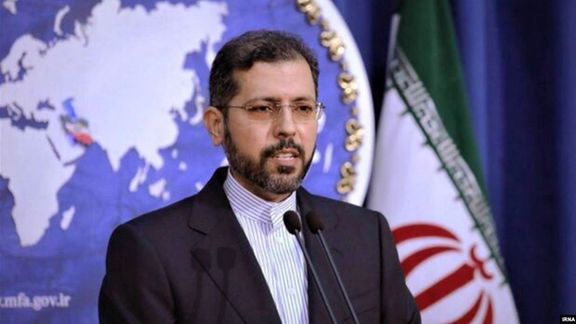Iran Says Awaiting Biden's 'Political Decision', Insists On Guarantees

Iran's says it is awaiting a political decision by Washington on nuclear talks and reiterated that a deal is possible "tomorrow" if the US provides guarantees.

Iran's says it is awaiting a political decision by Washington on nuclear talks and reiterated that a deal is possible "tomorrow" if the US provides guarantees.
“There will be no need to [wait] until the end of February if the European and American sides respond to Iran's initiatives today,” spokesman Saeed Khatibzadeh told a press conference in Tehran. “We can announce an agreement in Vienna tomorrow…The agreement is awaiting the other side's political decisions.”
Khatibzadeh said Iran needed "concrete guarantees" that that the US would not again withdraw from the 2015 deal, the JCPOA (Joint Comprehensive Plan of Action) as it did under President Donald Trump in 2018.
The spokesman was referring to reports of informal briefings that the end of the month constituted a deadline, a notion Iran has rejected. Khatibzadeh said that Iran and remaining JCPOA signatories – China, France, Germany, Russia, and the United Kingdom – were "seeking to get guarantees from the US” over Washington lifting all sanctions incompatible with the JPCOA and the United Nations Security Council resolution 2231, which endorsed the nuclear agreement.
Khatibzadeh reiterated that such sanctions should be removed "irrespective of what they are called or false labels," referring to statements by Trump administration officials that sanctions under the rubric of ‘human rights,’ ‘links to the leader’s office,’ or other ‘labels’ were designed to complicate any subsequent attempts to restore the JCPOA.
Mohammad Marandi, media adviser to Iranian negotiators in Vienna, told Russia's Sputnik that it is too early to know whether the US would accept Iranian conditions. "There is a significant possibility that there will be an agreement...as we see some movement from the US and Europe,” he said. “But there is also a chance there won't. Everything will depend on Washington and on whether they really want it."
Marandi told Sputnik that Iran wanted a "proper verification process," meaning transparency over the removal of sanctions. He reiterated that despite its pledges under the JCPOA, the US even after signing the agreement maintained formal and informal sanctions that precluded Iran from benefiting fully from the agreement.
International sanctions imposed by the United Nations Security Council were removed in 2015 and both the United States and Europe complied by removing sanctions incompatible with the Joint Comprehensive Plan of Actions (JCPOA).
'Behind closed doors'
"In 2015, we made sure to implement the deal,” Marandi said. “It was [President Barack] Obama, who didn't. Behind closed doors, he told the Treasury and various firms not to work with us."
He did not offer any evidence for claiming Obama obstructed efforts to comply with JCPOA.
Ali Shamkhani, Iran’s top security, tweeted Sunday that a “US political decision to realize or refuse to accept the requirements of a credible and lasting deal based on the principles accepted in JCPOA can replace speculation." Shamkhani suggested in another tweet that he was not optimistic as “western parties” − presumably meaning the US and western Europeans − were evading real commitments.
Asked about Shamkhani's remarks at his press conference, Khatibzadeh said developments in Vienna had reached “a difficult stage” with “important and key matters that all sides are following up closely.”
A source familiar with the talks told Iran International Monday that Iran was making “unrealistic demands,” which if pressed meant the “talks are bound to fail.” But Russia's envoy to the talks, Mikhail Ulyanov, wrote in a tweet Sunday that a meeting between remaining JCPOA participants without Iran had confirmed “significant progress has been made in the course of negotiations.”
An Iranian source familiar with the talks told Iran's Press TV Sunday that “rumors” were unfounded that the US would engage directly with Iran in the JCPOA Joint Commission. Tehran has insisted that Washington cannot take part in JCPOA structures until it returns to the agreement.